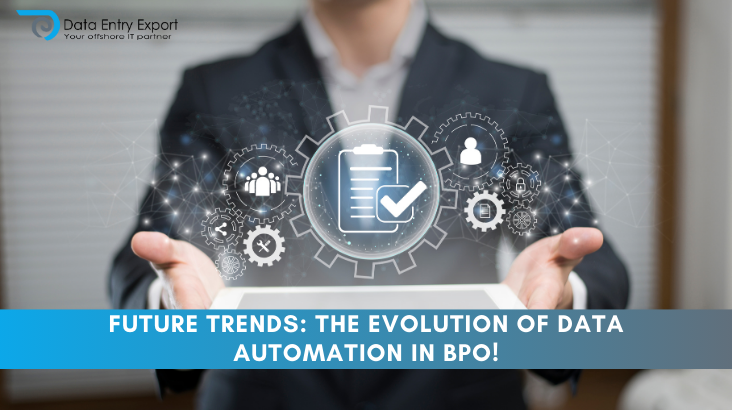In the fast-paced world of Business Process Outsourcing (BPO), the infusion of data automation is changing the way companies perform their operations. With organizations considerably focused on cost-efficiency, while improving accuracy and speed, data automation will remain one of the key growth drivers for the BPO industry. It is, therefore, instrumental for businesses to understand the trends to remain competitive and efficient. This blog shall look at the trends of data automation in BPO and how they are reshaping the industry.

An Increased Use of Artificial Intelligence(AI)and Machine Learning(ML)
Perhaps one of the most notable future trends in BPO lies in an increased adoption of AI and ML in data automation. These technologies allow BPO firms to get on with automating mundane tasks previously requiring human intervention. With AI-powered tools, the BPO industry could certainly give insights and advanced analytics to businesses in order to make data-driven decisions quickly.
There could be a change from simply replacing repetitive tasks to creating smarter, more efficient processes backed by workflows that indeed boost overall business performance.
The Shift Towards Robotic Process Automation(RPA)
Another trend influencing the future of data automation in BPO is Robotic Process Automation(RPA). RPA implements the automation of structured and semi-structured processes so that organizations can manage high transaction volumes without human effort.
With RPA, systems across different BPO firms can easily obtain higher productivity and, consequently, cost adjustments. This is indicated to continue the expansion of RPA as more companies understand the benefits it can bring to support business process operations.
Cloud-based automation solution
Cloud-based automation is the new big deal in the BPO industry, where companies migrating their operations to cloud technology. This technology allows organizations to use real-time data processing, remote access, and flawless collaboration between BPO firms and their clients. It also grows the scale of operations, allowing BPO companies to scale their processes up or down according to business demand.
With cloud-based automation, businesses enjoy a faster implementation pace while increasing their flexibility in complex task execution. This will remain an evolving trend where BPOs will seek agility in operations along with their customers.
Focus on Hyperautomation
Bringing several automation tools and technologies under one umbrella, hyperautomation encompasses AI, RPA, or the use of machine learning to deliver end-to-end automation of complex business processes.
It helps businesses have operational efficiency with deeper insights of their operations that will enhance decisions. Hyperautomation will lead the pack in terms of BPO data automation, thus pushing automation forward into more complex processes.
Enhanced Data Security and Compliance with Automation
With stringent data privacy laws across countries, data protection forms a significant concern for all businesses. Automated systems can identify possible breaches of security, and personal and financial information would be handled effectively to avoid vulnerabilities.
Another area of data automation ensures automatic updates of security protocols that can ensure better security from incidents of data breaches. With the increase in the rate of digitization, BPO companies will have to respect a set of certain high standards regarding data security and compliance.
Increased Scope of Automation for Customer Experience
As BPOs automate their back-office functions, so have they improved their customer experience. A BPO firm can allow its clients to enable quick, efficient service for its customers by automating processes that might involve customer inquiries, support tickets, and feedback collection.
This means that the BPO industry can respond more quickly and enjoy better customer satisfaction rates in the process; automation is such a game-changer in this line of business.
Automation for Data Analytics and Decision-Making
As businesses are increasingly relying on data to make informed decisions, BPO companies are harnessing automation to deliver much advanced data analytics services. By automating data collection, analysis, and reporting, BPO providers can furnish deeper insights into business performance, market trends, and customer behavior.
In the days ahead, more advanced automated analytics tools will be deployed by BPO firms facilitating speed and accuracy in business decision-making. Such trends are critical, given the fierce competition many companies face in the data-driven market.
Conclusion
This evolution of data automation in BPO will shape the future of the industry in terms of increasing efficiency, achieving cost savings, and improving service delivery. Developments in AI, RPA, hyperautomation, and other cloud-based solutions are putting BPO in a prime position to respond to the increasing demands of businesses in all sectors. While the technologies behind data automation will mature, it will still serve as the foundation of BPO innovation, creating further possibilities for growth and success.
For businesses that want to stay ahead, the adoption of these data automation trends would need to be leveraged to keep pace with the changes taking place across BPO.
